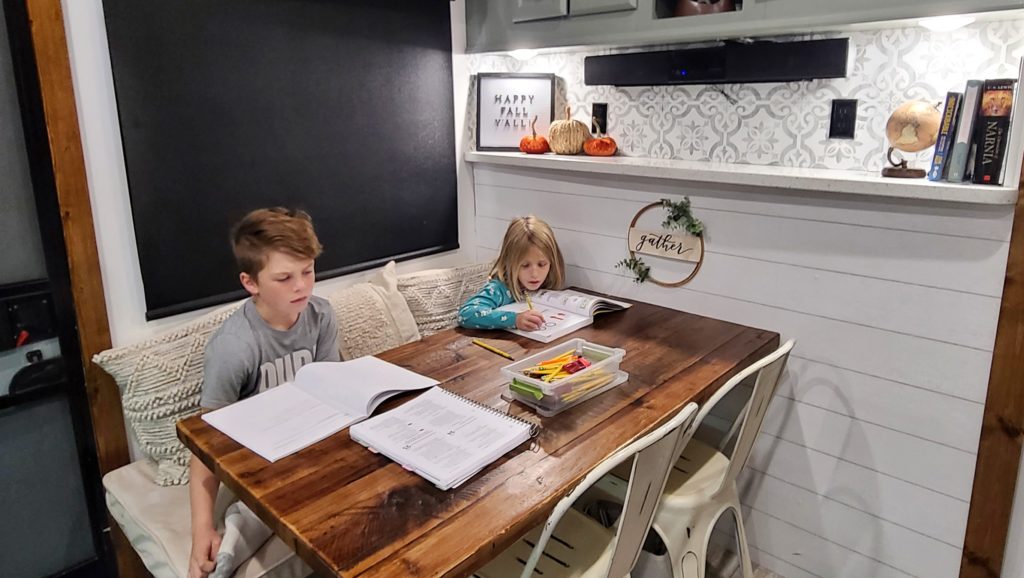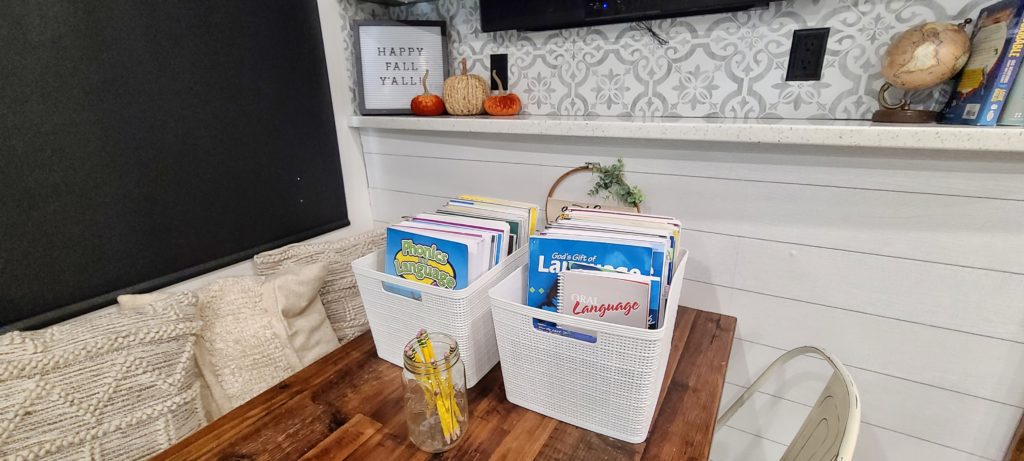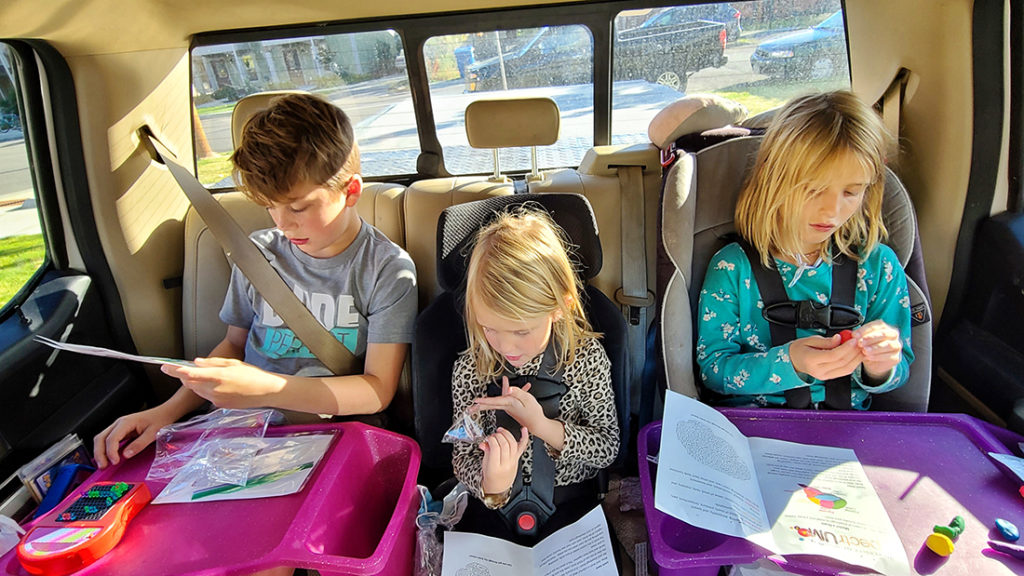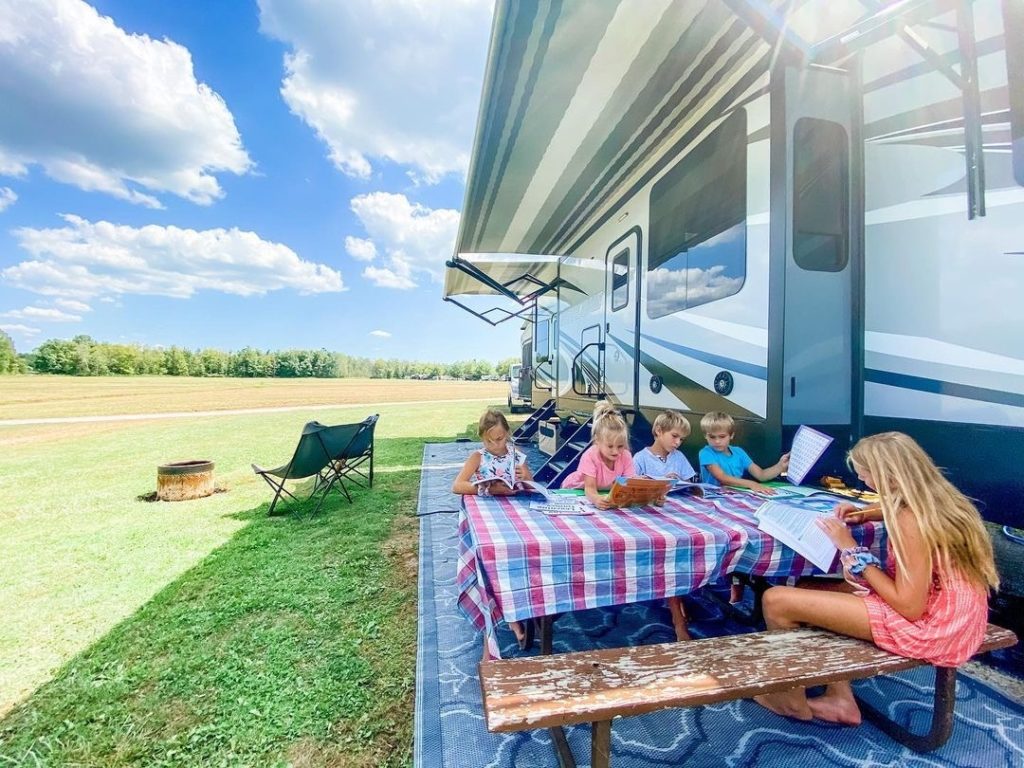Homeschooling on the Road: How We Make it Work
Original blog written by Molly Henard from @theflyinghens, owner of the Heartland Cyclone 4007.
September means back to school! After the events of the past year and a half, some families have chosen, or are considering choosing to homeschool.
I have been homeschooling my children for five years. By no means am I an expert at this, but I've definitely found confidence in my ability to give my children an education. My son is currently in 4th grade, my middle daughter is in 2nd, and my youngest is in preschool. I just love the flexibility of schedule and freedom that homeschooling allows for us to set our own pace, learn about what interests us, and spend more time together as a family.
But what about homeschooling your kids ON THE ROAD? We travel full-time around the country in our Heartland Cyclone 4007 with our three kids, how do we make it work? I think many of us who are interested in RVing or the full-time lifestyle have concerns over this topic. Maybe you’ve never homeschooled before, or don’t think you are qualified or have the patience to teach your children. These are all valid concerns. I felt this way too when I started - I felt totally overwhelmed and unqualified. However, I believe with finding the right curriculum and resources, as well as being equipped with the right tools, that parents can make the best teachers for their children!
Finding the Right Curriculum
School-at-Home
School-at-Home is usually a packaged workbook based curriculum. This structured approach may be especially helpful for parents who are new to homeschooling, because they offer guides and curriculum outlines for each subject. These guides that spell out exactly what to teach and how to teach the lessons, which may help the parent feel organized and prepared.
Online-Learning
Essentially online-learning is school-at-home, but all online. It can be distance learning through the local public school, an online academy like K-12, or other online-based curriculum. The benefits to online-learning is that the child is taught by a certified teacher(s) and there is little parent involvement. This could work well for parents who also have to work on the road. The downside is that you will need to have access to WIFI and that may be tricky on travel days or in certain areas of the country.
Both online-learning and a school-at-home workbook curriculum make it easy for reporting to the state and meeting state standards while still being able to travel.
Literature-Based Curriculum
A literature based curriculum is using literary books to learn about different subjects instead of traditional textbooks. It opens up for more family time and connection (parent reading to child) and an ability to teach multiple children at the same time. History, geography, science, communication, writing and grammar skills are just some of the subjects that children can gain in-depth knowledge and understanding.
Unit-Based Studies
A unit study based approach to homeschooling takes a particular theme or idea and bases all subjects around the topic. For instance, a unit study around oceanography will incorporate lessons for every subject. You can use all sorts of resources like workbooks, literature, videos, field trips and more to build a unit based study. This type of homeschool makes it easier to teach children of different ages at the same time, built around their level.
Unschooling
Unschooling is a way of letting children learn based on their interests. You can provide resources, games, books and experiences that help fuel their desire to learn more about something they are curious about. Unschooling is very much child-led and the parent is helping facilitate learning opportunities to support exploration.
Our Homeschool Journey & What We Use
Over the years I’ve used a variety of different curricula and workbooks. In the early years of homeschool, I followed the best advice I’ve ever received: keep it simple. You do not need to mimic the traditional school day schedule of 8am-3pm. When your kids are elementary aged, they really only need to focus on the basics: math, phonics, reading and penmanship. Everything else like history, health, and science can come from reading together, every day conversations, playing outside, trips to a zoo, farm, or museum, etc.
Now as my children are getting older, we use a structured, workbook “school at home” based approach to homeschooling. We use the Abeka Homeschool Curriculum and we love it. I prefer having a curriculum outline already made for me to follow and stay organized. I also love that they provide a sample school year calendar to follow- this helps me try and keep on pace throughout the year. My children also do very well with structure and workbook based learning. If you want to get a glimpse into our Abeka curriculum, you can watch our YouTube video here.
A great deal of our learning comes through travel and experiences. Our “classroom” also happens at zoos, museums, and national parks. We’re always learning about the world around us, through conversations we have about their curiosities.
Legal Matters
It’s important to understand the homeschool requirements and laws in your state of residence. Every state is different! You can find more information here. You may have to formally withdraw your child(ren) from school, you may have to submit notice of homeschooling, keep records and grades, and submit standardized test scores at the end of the year. This is all dependent on your state. Our home base is in Texas, which has one of the most lax homeschooling rules in the country.
Tips for Homeschooling on the Road
Find out what works well for you and your children. Maybe your kids sleep in and you like to get some work done in the mornings, and therefore would prefer to start the school day later. For our family, our kids wake up super early and are most alert in the morning. Our school day starts in the morning and we are usually finished by noon, or we take a break for lunch and then wrap up extra subjects afterwards.
Our sample daily school schedule looks like this:
8am- Breakfast, Chores & Daily Devotion
9am- School work (I alternate between teaching my two older children their lessons, while the youngest works on her workbooks) They complete their respective books for arithmetic, spelling, phonics, penmanship and reading.
12- Lunch
12:30-2pm- Subjects like science, history and health are done all together (I use 4th grade level books)
Our goal is to be finished each day by 2pm or earlier! If we happen to be visiting a National Park or other area of interest, we may choose to vary our schedule to allow us to go hiking in the morning and do school work later in the day.
Stay Organized
Keep all your workbooks, guides, lesson plans, etc in a space that is easily accessible. Last year I tried keeping them in cabinets but it became a pain to pull them out everyday. This year, I got sturdy bins to keep each child’s books in, and we keep these on the floor under our table. This set up keeps us organized, as well as makes it easy to access books as well as quick transitions from subject to subject.
Have Designated Spaces for Homeschool
Choose a space or spaces for your children to do their school work. This could be the kitchen table, a desk space in the kids room, the picnic table outside… it’s up to you and what works well for your family!
Our kitchen table is our designated school space to do school work. We also have a desk in our back toy-hauler room that the kids can do work separately if they are distracted. Other subjects that we do all together like reading, science, and history are free to be done outside or on the couch. We also do a lot of school work in the car on travel days, which I’ll highlight later in this post.
Feel free to switch it up! If you want a break from the same routine, head to a local library or park to do school work for the day.
Get out!
If you know you will be in a city or area where there is a great zoo, museum, or other interesting place, plan to go explore! Build it into your curriculum for the week. If you are visiting a National Park, part of their learning can be in completing their Junior Ranger books and earning a badge. For more information on the free Junior Ranger program, click here. Are you visiting a place rich in history? Do some research about the area and build it into their history curriculum for the week.
Stay Flexible
If you know anything about RV life, you know that things don’t always go according to plan. RV repairs, maintenance, bad reception, weather, etc can all throw a curveball into travel plans. If travel plans are messed up, then doing homeschool can also be thrown off. Don’t feel like you HAVE to always stick to the homeschool schedule. You may have some days where you don’t get anything done because more important matters need to be handled, and that’s okay! You don’t have to stick to a Monday-Friday schedule with every typical school break or holiday off. You are in control of your school schedule, make it work for your family!
Keep the Kids Interested
My kids are big on incentives- whether it be screen time, playing with friends, or going to a fun activity like a pool or playground. My children know that they do not get to do any of those things until their school work is done for the day. We limit “screen time” to TV during the week (about 30-60 minutes) and they get to play video games for a little while on the weekends, which are big motivators to finish their school work during the week!
Get Social
I know a big concern with full-time RVing and homeschool is the question of socialization. How will the kids find friends?
We personally have NEVER had an issue with finding friends on the road. Whether at an RV park, or boon-docking, we always find at least one family with kids to play with!
Utilize resources like joining Full-time Families or Xscapers, a membership of thousands of families that schedule fun meetups and events! Use social media to find what people may be traveling near you (we did this for our fall travels and now we are traveling with another family!) You can plan to travel with another family or two for a season. There are also various Facebook groups for full-time RVers (try one your specific RV brand) We are part of a Facebook group of Full-Time Pilot Families and it’s great!
More questions, answered:
What About Sports?
I think it’s important to understand why you want your child to participate in sports. If you’re dreaming of your kid being a Major League Baseball player or an Olympian athlete when they grow up, then the full-time RV life may not be for you. If your child just wants to have fun, fine tune their skills, and have some competition, then they can absolutely still do sports on the road!
Some sports that are relatively easy to do while fun time traveling: golf, tennis, disc golf, pickle ball, skateboarding, archery, biking, swimming, and running (among others). In almost every city you go to, you will probably find a facility or park that offers an opportunity to practice or play these sports.
If your child really loves baseball or soccer or other sport, there’s no reason why you can’t do those sports too. You can choose to stay stationary for a short season while your child plays on a team. We actually go back to our “home base” in east Texas (near family) for three months in the spring so that our son can play Little League baseball. You can do this anywhere actually, just by signing up with a local league wherever you may be!
What About Extracurriculars?
Maybe your child isn’t really into sports. Does your child enjoy art? Coding? Maybe they want to learn how to play an instrument? Outschool is an excellent resource for taking these types of classes. Outschool offers thousands of online classes for different subjects (even school subjects!) that are organized by grade. Different classes are offered at varying days and times.
How Do I Manage School Work on Travel Days?
Since we travel often, and sometimes for stretches of a few days in a row, we have no choice but to do school in the car! Since we use a workbook based curriculum, it is relatively easy to do work in the car on travel days. I pack a sturdy bin for their workbooks. To save space, I take pictures on each subject’s lesson plan and teacher answer key for teaching that day, so we don’t have to take those books with us. Certain subjects, like penmanship or something with a lot of writing will be saved until we are stopped for the night since it would be nearly impossible to practice good handwriting in a bumpy car! We are fortunate that our children do not get car sick looking down at their workbooks. You may want to be aware of this potential issue with your children if you want to do school work in the car. We just got these cool lap desks (pictured above) for the car and they work great for the older two kids to do their work in the car.
—
I hope this blog is helpful to those who are curious about how to make full-time travel and school for their children work.
If you are considering homeschool for your children so that you can hit the road, I’d recommend doing in depth research of the different types of homeschool options. You know your children and their learning style best! Also, make sure you know all of the regulations and laws for homeschool in your state.








